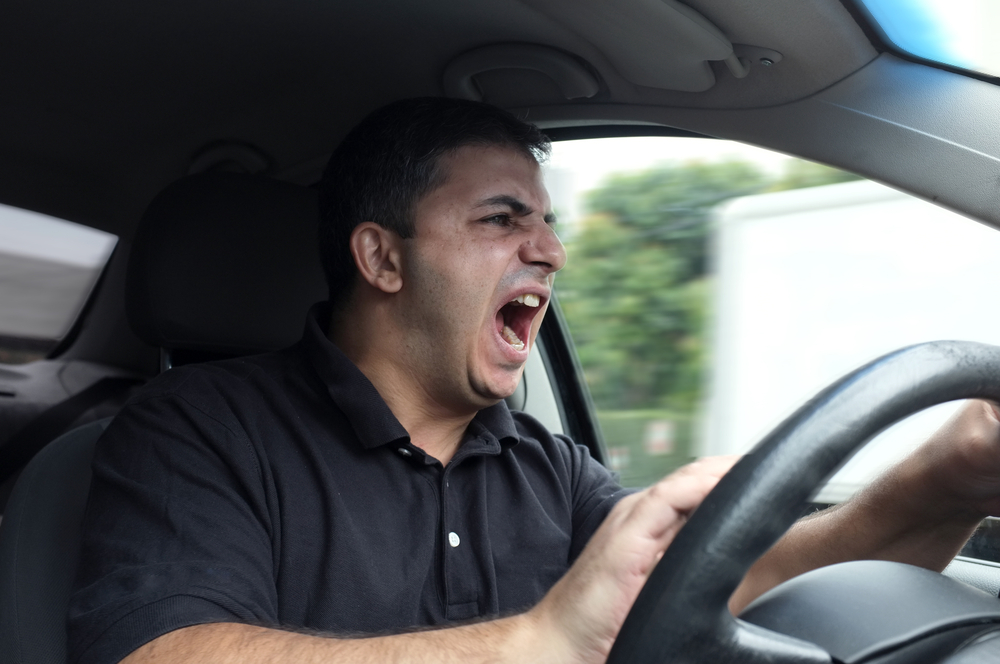Road rage is a sudden eruption of fury behind the wheel, a fit of uncontrolled, intense anger directed at fellow motorists—an all-too-common phenomenon on our streets and highways. Is it merely aggressive driving, or does it suggest something more profound about the psychological makeup of the driver who exhibits it?
This blog post sheds light on the misunderstood behavioral issue of road rage. We unpack its definition, explore its diverse types, illuminate its causes and consequences, and provide you with the knowledge to identify and respond to it. We also discuss the legal issues surrounding road rage and the role an experienced Atlanta personal injury lawyer can play in securing compensation if you suffer injuries in a road-rage accident.
Overview of Road Rage
Drivers exhibiting road rage show volatile and dangerous behavior in what they perceive as stressful or frustrating situations. This reaction typically involves uncontrolled anger, often resulting in aggressive driving actions. While numerous factors can trigger this, it invariably poses a significant risk to the safety and well-being of all road users.
There are critical distinctions between road rage and speeding and aggressive driving. Aggressive driving might involve speeding, changing lanes without signaling, running red lights, or following too closely. These actions reflect a disregard for traffic rules and safety norms but are not inherently emotion-driven or outwardly directed.
Road rage, in contrast, is a fit of violent anger in which a driver uses their vehicle and driving behaviors to express their emotions and retaliate against other motorists.
A driver experiencing road rage might pose a more immediate and severe risk than one who is only driving aggressively, as their actions are not just negligent but driven by a loss of emotional control, intention to cause harm, or extremely reckless disregard for others.
Various psychological factors can trigger road rage. They involve poorly regulated emotional responses to internal or external stressors. For example, frustration and impatience with traffic congestion, running late, or the perceived inconsiderate actions of other drivers may lead to road-rage incidents.
Personal problems, such as financial difficulties, relationship issues, or job stress, might also prime drivers to lose control of their emotions, potentially triggering road rage.
Despite these triggers, road rage is an extreme and avoidable reaction. Learning to manage stress and developing healthy coping mechanisms can prevent it. Drivers who cannot control themselves can face significant legal and financial liability for the harm from their actions.
Types of Road Rage
Road rage encompasses a spectrum of behaviors that vary in intensity and form. Here are its three most common forms:
Verbal Road Rage
Verbal road rage often involves angry honking, shouting, cursing, or even offensive hand gestures directed at other drivers. As a driver, it's common to feel frustrated when someone cuts you off or you get stuck behind slower traffic, sometimes triggering verbal road rage.
This is one of the most common forms of road rage, and although it may not result in immediate physical harm, it can quickly escalate and endanger others.
Quiet Road Rage
Quiet road rage is the most insidious form because it's less visible and is easy to dismiss or overlook. It can include tailgating, speeding, swerving, or refusing to yield the right of way to another driver. This silent expression of anger, resentment, or frustration towards other drivers can lead to risky driving behaviors and accidents.
Epic Road Rage
Epic road rage represents the most extreme form of this behavior, involving intentional physical harm or violence toward other drivers. It can range from chasing and forcing another driver off the road to physical confrontations and even assault. Cases of epic road rage are relatively rare but can have serious, even deadly, consequences.
Potential Consequences of Road Rage
Road rage can have severe, sometimes long-lasting, consequences. Let's consider some potential outcomes of road-rage incidents, from physical injuries to emotional and psychological impacts.
Physical Consequences
Because road rage often involves dangerous driving behaviors, such as reckless driving, tailgating, speeding, and physical confrontations, it often results in accidents, injuries, and, sometimes, tragic fatalities. Accidents induced through road rage harm the individuals directly involved and pose a risk to other motorists, pedestrians, and property.
Legal Consequences
Road-rage incidents can have severe legal consequences. The behaviors inherent in road rage are illegal. Perpetrators of road rage can face jail time, fines, loss of driving privileges, and increased insurance rates. They can also face financial liability for the damages their actions inflict on other motorists and road users.
Emotional and Psychological Consequences
Road rage takes a significant emotional and psychological toll on both the aggressors and the victims. The victims of road rage can experience fear, anxiety, stress, and even post-traumatic stress disorder in severe cases.
Aggressors, conversely, may live with guilt, regret, and increased stress levels, particularly when facing legal charges. From a broader perspective, road rage adds to the overall stress and anxiety of driving, creating a more hostile and less safe environment for everyone on the road.
Recognizing Road Rage
By recognizing the signs in other drivers and even within ourselves, we may avoid confrontations and escalating situations.

Alertness and observation are essential when identifying road rage in other drivers. Watch for glaring red flags, such as persistent honking, tailgating, swerving in and out of lanes, excessive speeding, and making hostile hand gestures. Look for drivers who seem intent on physical confrontations or using their vehicles to crowd or intimidate.
Self-awareness is another crucial element in preventing road rage. If you become easily irritated while driving, or if your driving becomes aggressive in response to stress or the actions of other drivers, it's crucial to acknowledge these signs and take steps to mitigate them.
Responding to Road Rage
Navigating a situation involving a driver with road rage can be quite challenging. Ideally, the goal is to de-escalate the situation and get yourself to safety without engaging in a similar pattern of aggressive behavior.
Dealing With Drivers Experiencing Road Rage
When encountering a driver experiencing road rage, the first rule is to avoid confrontation. Maintain a safe distance from the aggressive driver and avoid making eye contact or responding to any gestures of aggression. An apologetic wave might sometimes help, even if you haven't made a mistake, as this can often calm an enraged driver. If another driver's road rage persists or escalates, contact law enforcement.
Remember the importance of defensive driving. Stay alert, pay attention to your surroundings, and anticipate potential problems. Defensive driving can help avoid dangerous situations involving a driver exhibiting road rage and give you more time to react.
Managing Your Emotions Behind the Wheel
If you notice you can lose control of your emotions while driving, take time to recognize the triggers that cause you to become frustrated or angry and manage them. You could, for instance, leave early to avoid rush hour, practice deep-breathing exercises, or listen to calming music during your commute.
Also, remember that everyone makes mistakes, and you shouldn't take others' driving errors personally. Rather than responding with anger, try to empathize with other drivers and remember that they are humans, too. If your anger rises, consider pulling over (when safe) and taking a few moments to calm down.
Your Rights as the Victim of a Road-Rage Accident
Being a victim of road rage entitles you to seek compensation for your losses. Your claim for monetary damages would be a civil matter, separate from any criminal charges the driver who caused damage through road rage might face. You can claim compensation regardless of whether the perpetrator faces criminal consequences.
Depending on the severity of the incident and the jurisdiction, you might have grounds for a personal injury lawsuit or a claim under your auto insurance or the at-fault driver's liability insurance coverage.
And although every road-rage accident differs in the types and amounts of compensation available, a victim can typically pursue payment for their:
- Medical expenses, including costs of hospitalization, surgeries, medication, therapy, and any other treatment required directly because of the road-rage incident.
- Costs of repairing or replacing a damaged vehicle or other personal property.
- Lost earnings and job benefits from missing work while healing or because of a temporary or permanent disability.
- Physical pain and emotional suffering the road-rage accident causes, injuries, or medical treatments.
- Diminished quality of life and loss of independence.
Sometimes, courts also award punitive damages to road-rage accident victims. These damages punish the perpetrator for their egregious behavior and deter others from acting similarly.
To determine the types and amount of compensation you can recover, call a car accident lawyer near you.
Schedule a Free Initial Consultation Today!
The Role of an Attorney in Seeking Compensation for a Road-Rage Accident
If you fall victim to a road rage accident, it's crucial to engage the services of an experienced personal injury attorney as soon as possible. An attorney can handle obtaining compensation on your behalf, giving you the time and space to focus on healing and rebuilding from your trauma.

Car accident attorneys in Atlanta can perform many tasks in representing your interests and enforcing your rights to compensation. They tailor their steps to fit your needs and priorities.
Those steps can include:
- Investigating a road-rage incident to determine what triggered it.
- Gathering evidence to prove the road-rage driver's liability.
- Evaluating your damages to calculate the maximum amount you can claim.
- Handling all interactions with your insurance company and the road-rage driver's insurance company as your representative.
- Advocating for you and protecting your interests with any criminal prosecution of the driver who exhibited road rage toward you.
- Preparing the legal documentation for a lawsuit or insurance claim seeking compensation on your behalf.
- Negotiating with insurance companies and defense lawyers to secure a fair settlement of your claim instead of taking it to trial.
- Taking your claim to trial when necessary to prove the road-rage driver's (and anyone else's) liability for your damages.
- Following up to ensure you receive all money owed under a settlement, judgment, or jury verdict.
In the aftermath of a road-rage accident, time is of the essence. The sooner you contact an attorney, the better your chances of successfully claiming compensation. An early start allows your attorney to gather evidence while it's fresh and ensures you can complete all critical deadlines for filing a lawsuit or insurance claim.
Don't put off contacting an attorney out of concern about the cost. Most lawyers for road-rage accident victims offer a free initial consultation for you to learn about your rights and options risk-free. They also routinely work on a contingent fee basis. You don't pay any legal fees unless you win your case or receive a settlement. You get the legal help you need while paying no upfront costs.
Contact an Experienced Road-Rage Accident Injury Lawyer Today
Road rage shouldn't happen, but it does, and this terrifying phenomenon can have severe and potentially deadly consequences. Furious drivers endanger the public by creating conditions that all too easily lead to violent accidents, injuries, and fatalities.
If you or someone you love sustained injuries in an accident caused by a driver experiencing road rage, you have valuable rights to receive compensation for your losses.
An experienced car accident injury lawyer can handle your claim and work to get you the maximum compensation available from insurance companies, the driver, and anyone else liable for your damages.
An initial consultation with an experienced lawyer is free of charge. Contact a lawyer today to learn about your rights and options.




























